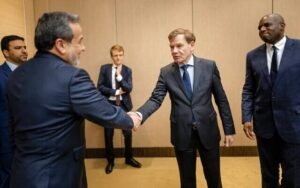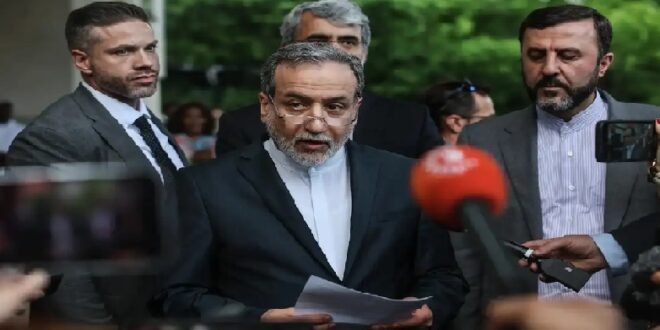22-06-2025
ISTANBUL: A senior Iranian official said on Saturday that proposals put forward by European powers at talks in Geneva about his country’s nuclear program were “unrealistic”, suggesting that if they stuck to them it would be difficult to reach an accord.
There were few signs of progress on Friday after the foreign ministers of Britain, France and Germany, known as the E3, plus the EU met their Iranian counterpart in a bid to prevent the conflict between Israel and Iran from escalating.
 “The discussions and proposals made by the Europeans in Geneva were unrealistic. Insisting on these positions will not bring Iran and Europe closer to an agreement,” the senior official told media, while speaking on condition of anonymity.
“The discussions and proposals made by the Europeans in Geneva were unrealistic. Insisting on these positions will not bring Iran and Europe closer to an agreement,” the senior official told media, while speaking on condition of anonymity.
“In any case, Iran will review the European proposals in Tehran and present its responses in the next meeting,” the official said.
Both sides signaled on Friday their readiness to keep talking, although no new date was set.
European diplomats said Friday’s talks had been aimed at testing Tehran’s willingness to negotiate a new nuclear deal despite there being no obvious prospect of Israel halting its attacks soon.
While neither side disclosed details of what was put forward, two European diplomats said the E3 did not believe that Israel would accept a ceasefire in the near term and that it would be difficult for Iran and the US to resume negotiations.
They said the idea was to begin a parallel negotiating track, initially without the US, on a new deal that would involve tougher inspections including potentially of Iran’s ballistic missile program, while allowing Tehran some notional uranium enrichment capacity.
French President Emmanuel Macron on Saturday spoke with his Iranian counterpart and said the two sides had agreed to accelerate negotiations, although he insisted it was up to Iran “to provide every assurance that its intentions are peaceful.”
 Despite some European ministers suggesting on Friday that Iran was more ready to talk about issues beyond the nuclear program, the senior official dismissed the possibility of negotiating its defensive capabilities, including its missile program and repeated that the idea of zero enrichment of uranium was a dead end.
Despite some European ministers suggesting on Friday that Iran was more ready to talk about issues beyond the nuclear program, the senior official dismissed the possibility of negotiating its defensive capabilities, including its missile program and repeated that the idea of zero enrichment of uranium was a dead end.
“Iran welcomes diplomacy but not under the shadow of war,” the official said.
However, Israel said on Saturday it had killed a veteran Iranian commander during attacks by both sides in the more than week-long air war, while Tehran said it would not negotiate over its nuclear program while under threat.
Saeed Izadi, who led the Palestine Corps of the Quds Force, the Iranian Revolutionary Guards’ overseas arm, was killed in a strike on an apartment in the Iranian city of Qom, said Israeli Defence Minister Israel Katz.
Calling his killing a “major achievement for Israeli intelligence and the Air Force”, Katz said in a statement that Izadi had financed and armed the Palestinian militant group Hamas ahead of its October 7, 2023, attack on Israel, which triggered the war in Gaza.
The Revolutionary Guards said five of its members died in attacks on Khorramabad, according to Iranian media. They did not mention Izadi, who was on US and British sanctions lists.
Iranian media said earlier on Saturday that Israel had attacked a building in Qom, with initial reports of a 16-year-old killed and two people injured.
At least 430 people have been killed and 3,500 injured in Iran since Israel began its attacks on June 13, Iranian state-run Nour News said, citing the health ministry.
In Israel, 24 civilians have been killed by Iranian missile attacks, according to local authorities, in the worst conflict between the longtime enemies. (Int’l News Desk)
 Pressmediaofindia
Pressmediaofindia




